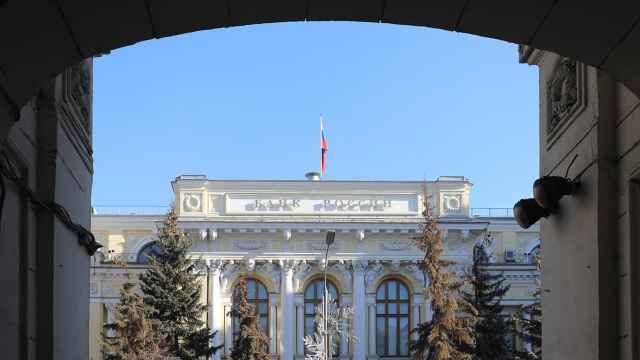Credit-rating agency Standard and Poor's said Thursday that the government's approach to banks under its control was "conflicted" as state-owned Sberbank appeared likely to go ahead with a flagship $5.5 billion privatization in April.
The share price of the country's biggest lender has recently broken through the 100 ruble threshold set by bank president German Gref and Central Bank Deputy Chairman Alexei Ulyukayev as a precondition for the sale.
Standard and Poor's, or S&P, said there was a contradiction between the privatization plans for Russia's state-owned financial institutions and pressure for growth. Later this year, the government is likely to sell a stake in VTB, the country's second-largest bank. VTB has openly said it needs to raise capital.
Citing unnamed sources, business daily Vedomosti reported Thursday that Sberbank's privatization was scheduled for April. The Central Bank originally planned to offer a 7.6 percent stake in Sberbank to investors in the fall of 2011, but it was delayed after markets plunged.
The roadshow for the sale will begin on April 26, Reuters reported. Sberbank declined to comment on the time frame Thursday.
"There is a conflict between wanting to privatize and wanting things to grow and needing capital," Scott Bugie, managing director of financial ratings at S&P, told a news conference Thursday.
"The state is conflicted because it says it wants to privatize banks, but it is also pretty aggressive in pushing banks to expand," he said. "Sometimes it capitalizes and sometimes it doesn't."
Government-owned banks controlled 53.3 percent of the market in 2011, according to statistics from S&P. In 2007, the figure was 43.4 percent. The top three banks in the country — Sberbank, VTB and Gazprombank — controlled 41.6 percent of the market in 2011.
The dominance of state-owned banks and their expansion in recent years has squeezed privately owned institutions, including foreign banks. "There are more risks for the private-sector banks," Bugie said.
In a report released Wednesday, S&P outlined traditional reasons for their current assessment of Russia's banking sector, which has a lower rating than that of other emerging markets including India and China.
The economy's dependency on commodity prices, the poor credit standing of nonexport industries, regulatory failings and shallow domestic capital markets were weaknesses for the banking industry, the report said. Reduced economic balances, a current account surplus and funding expansion with retail deposits were among the strengths.
"The privatization of 7.6 percent of Sberbank will not have a significant effect on the bank's credit profile," Bugie said. The state will retain 50 percent plus one share of the lender after the sale.
Bugie said capitalization and any funds raised in privatization were more of an issue for Russia's second-biggest lender
"The capital is more in play for VTB than for Sberbank," Bugie said.
A Message from The Moscow Times:
Dear readers,
We are facing unprecedented challenges. Russia's Prosecutor General's Office has designated The Moscow Times as an "undesirable" organization, criminalizing our work and putting our staff at risk of prosecution. This follows our earlier unjust labeling as a "foreign agent."
These actions are direct attempts to silence independent journalism in Russia. The authorities claim our work "discredits the decisions of the Russian leadership." We see things differently: we strive to provide accurate, unbiased reporting on Russia.
We, the journalists of The Moscow Times, refuse to be silenced. But to continue our work, we need your help.
Your support, no matter how small, makes a world of difference. If you can, please support us monthly starting from just $2. It's quick to set up, and every contribution makes a significant impact.
By supporting The Moscow Times, you're defending open, independent journalism in the face of repression. Thank you for standing with us.
Remind me later.






